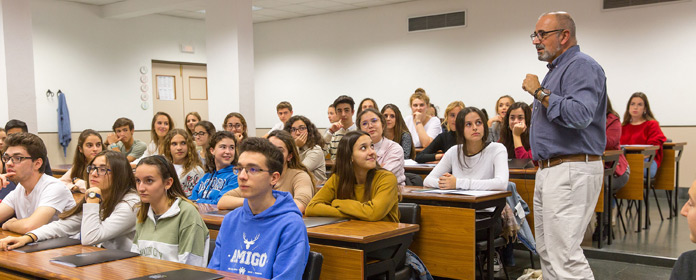2019_11_11_CIE_club-ciencia
More than 170 students from high school diploma from all over Spain participate in the eighth edition of the Science Club of the University of Navarra.
63 students from 26 schools in Navarre will attend seven training sessions on different areas of education

PHOTO: Manuel Castells
The School of Sciences of the University of Navarra organizes for the eighth consecutive year the 'Science Club', an informative activity aimed at students of 2nd year of high school diploma from all over Spain and whose main goal is to bring science closer to the new generations. "The goal of this activity is to awaken scientific vocations by bringing science closer in a simple, internship and informative way, with the help of researchers and professors from reference letter", says José Manuel Trillo, director of development of the School of Sciences.
More than 60 students from schools in Navarrawill participate in the on-site modality and another 110 students from the rest of Spain, who have been selected for their good academic transcript , will receive online sessions.
Until next February, students from Navarre will attend seven Wednesdays at the facilities of the School de Ciencias to receive training in different areas. In these sessions, of one hour's duration, topics on different disciplines such as physics, mathematics, Biochemistry , Genetics, zoology, Plant Biology and Chemistryare addressed. "The sessions have a practical content, in addition to motivating students to reflect on the importance of the different branches of scientific knowledge," adds Trillo.
The sessions planned for this eighth edition are the following: "Four hysterias about microbes: science, rigor and humor" given by Ignacio López-Goñi, director of the Science Museum; 'The Chemistry, a natural science', by Professor José Ramón Isasi; 'Urban fauna, the animals you can find in the city and the most interesting thing: why' by Enrique Baquero; 'Science against crime: Analysis of genetic profiles obtained by polymerase chain reaction (PCR)', by Iñigo Izal; 'The solution goes through science: the deterioration of the environment', by David Galicia; 'Collective behavior' by Iker Zuriguel; and 'Looking for immortality?', by Guillermo Zalba.
These face-to-face sessions are videotaped and the students doing the activity remotely can access them a week later and ask questions to the researchers via e-mail.

